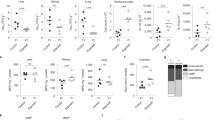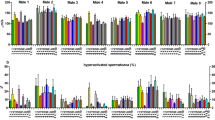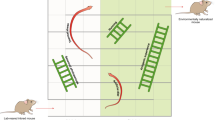Abstract
The notion that an adaptation acquired during an organism's lifetime can somehow be imprinted on the genome and so become heritable has been faulted by every critical test to which it has hitherto been exposed, but many naturalists have lost their faith in what seems to them to be the all-encompassing explanatory glibness of neo-darwinism. Although this criticism is unfair it is entirely proper that neo-darwinism should be under constant critical scrutiny. Interest was therefore aroused by the claim of Gorczynski and Steele1 that tolerance of A strain antigens induced in CBA mice by injecting into them (CBA × A/J)F1 spleen and bone marrow cells could be transmitted down the male line. Such a claim is of particular interest because spermatozoa, unlike oocytes, are produced throughout life and might thus conceivably have participated in the mechanism envisaged by Steele2 as that responsible for the supposed transfer of genetic information from soma to germ plasm. It was claimed that as many as 60% of the progeny of tolerant fathers mated with normal CBA females were unresponsive or hyporesponsive in an in vitro assay in which their spleen cells were tested for reactivity against A/J strain histocompatibility antigens in the cell-mediated lympholysis assay (CML). We describe here our failure to confirm these findings and our inability to extend them by testing the progeny for their reactivity against skin allografts from the tolerance-conferring strain.
This is a preview of subscription content, access via your institution
Access options
Subscribe to this journal
Receive 51 print issues and online access
$199.00 per year
only $3.90 per issue
Buy this article
- Purchase on Springer Link
- Instant access to full article PDF
Prices may be subject to local taxes which are calculated during checkout
Similar content being viewed by others
References
Gorczynski, R. M. & Steele, E. J. Proc. natn. Acad. USA. 77, 2871–2875 (1980).
Steele, E. J. Somatic Selection and Adaptive Evolution. On the Inheritance of Acquired Characters, 1–91 (Williams & Wallace, Toronto, 1979; Croom Helm, London, 1980).
Billingham, R. E. & Medawar, P. B. J. exp. Biol. 28, 385–402 (1951).
Chandler, P., Matsunaga, T., Benjamin, D. & Simpson, E. J. immun. Meth. 31, 341–350 (1979).
Beverley, P. C .L., Brent, L., Brooks, C., Medawar, P. B. & Simpson, E. Transplant Proc. 5, 679–684 (1973).
Brenan, M. J. thesis, Univ. London (1981).
Gorczynski, R. M. & Steele, D. J. Nature 289, 678–681 (1981).
McLaren, A., Chandler, P., Buehr, M., Fierz, W. & Simpson, E. Nature 290, 513–514 (1981).
Hašek, M., Holáň, V. & Chutná, J. in Cellular and Molecular Mechanisms of Immunological Tolerance (Dekker, New York, in the press).
Guttmann, R. D., Vosika, G. J. & Aust, J. B. J. natn. Cancer Inst. 33, 1–5 (1964).
Billingham, R. E., Brent, L., & Medawar, P. B. Phil. Trans. R. Soc. B239, 357–414 (1956).
Medawar, P. B. in The Uniqueness of the Individual, 79–107 (Methuen, London, 1957).
Author information
Authors and Affiliations
Rights and permissions
About this article
Cite this article
Brent, L., Rayfield, L., Chandler, P. et al. Supposed lamarckian inheritance of immunological tolerance. Nature 290, 508–513 (1981). https://doi.org/10.1038/290508a0
Received:
Accepted:
Issue Date:
DOI: https://doi.org/10.1038/290508a0
This article is cited by
-
Can revisionism, in evolutionary biology, help in formulating hypotheses about hominid evolution?
Human Evolution (1992)
-
Influence of paternal immunity on idiotype expression in offspring
Immunogenetics (1985)
-
The question of inheritance of immunological tolerance
Survey of Immunologic Research (1985)
-
Further studies on supposed lamarckian inheritance of immunological tolerance
Nature (1982)
-
Immune reactivity of progeny of tetraparental male mice
Nature (1981)
Comments
By submitting a comment you agree to abide by our Terms and Community Guidelines. If you find something abusive or that does not comply with our terms or guidelines please flag it as inappropriate.



